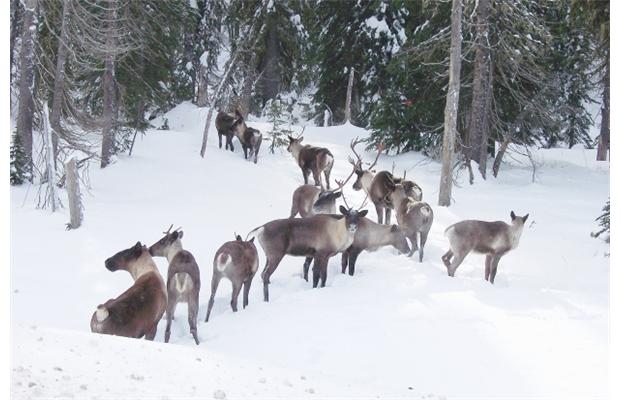Feds under fire for failure to protect Caribou
A February 14 decision in Vancouver Federal Court ruling that the federal government broke the law by not posting recovery plans for four species at risk may help the endangered southern mountain caribou in the Kootenays.
The lawsuit, filed by five environmental groups including Wildsight from the East Kootenay, claimed that the federal government broke its own laws by taking years to post recovery plans for four species at risk: the Southern Mountain Caribou, the Pacific Humpback Whale, the Nechako White Sturgeon and the Marbled Murrelet.
All four species named in the court action are affected by oil and gas expansion plans in British Columbia and Alberta, in particular the Northern Gateway pipeline proposal, the groups said.
Thus, important information on their recovery plans was not presented at the Northern Gateway panel hearings that would identify the critical habitat to be protected.
“The judgment was very clear,” said Wildsight’s John Bergenske. “The federal government was acting illegally. The judge was clear that the failure extends to another 160 plus species and is a systemic problem.”
In her judgment, Justice Anne L. Mactavish said the delay in these four cases “arejust the tip of the iceberg. There is clearly an enormous systemic problem within the relevant Ministries, given the respondents’ acknowledgement that there remain some 167 species at risk for which recovery strategies have not yet been developed.”
As a result of the lawsuit, the federal government posted draft recovery plans for the species that were the subject of the case, Bergenske said. “There’s no doubt that the recovery plans would have not been posted without this lawsuit.”
The Caribou recovery plan is now posted (http://www.sararegistry.gc.ca) and the public comment period closes March 18.
“The draft planfor mountain caribou contains a good overview of necessary actions, but it must map all of the critical habitat needed for recovery and management plans that will effectively protect that habitat, otherwise the legislation is simply an empty shell that will allow the ongoing loss of caribou populations to continue,” Bergenske said.
Nelson forest ecologist Greg Utzig agrees. He is on the Provincial Caribou Scientific Team.
“The recovery plan lays out a broad strategy, and it’s pretty good. But it’s lacking detail. Maps should have been included at this stage.”
Not only does the plan not include maps of the critical habitat, but it is lacking some specificity around the herds in the area, he said. “There’s quite a broad variety,” said Utzig. “The herds extend from Prince George to the border.”
For instance, most southern mountain caribou eat the lichens high son the trees of old growth forests, but the northern caribou eat ground lichens.
Recent numbers indicate that the Selkirk herd has dropped from 47 to 26 members.
“Predation is an issue equally as important as critical habitat,” said Utzig, adding that the provincial government added 2.2 million hectares to caribou habitat five years ago.
“The numbers of predators over the years has increased as the ungulates have increased.”
Whether or not the recovery plan will affect provincial actions is unclear, said Utzig. SARA (Species at Risk Act) only affects federal lands.”
The annual provincial caribou census is now underway in the Kootenay region.
EcoJustice lawyers acted for the Sierra Club, the David Suzuki Foundation, Wildsight, Western Canada Wilderness Committee and Greenpeace Canada in the federal lawsuit.
For more information http://www.sierraclub.bc.ca/our-work/mining-energy/big-win-for-species-at-risk#sthash.rT2IOEpm.dpuf; www.ecojustice.ca



























Comments